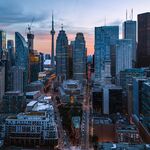Prometheus The Supremo
►Member №41+⅜◄
Member Bio
- Joined
- Apr 23, 2007
- Messages
- 4,107
- Reaction score
- 5
- Location
- a strange reality, bizarro toronto
First, an UHI is not desirable in a desert city because the warmer nights substantially increases energy (cooling) demand in the summertime. Second, most roofs are not reflective. Thirdly, the absorption and release of heat from pavement is a greater contributor to UHI than pretty much anything else and low density sprawling cities tend to have a greater proportion of their surface area paved in asphalt (as well as a much larger overall area paved, in general). Finally, a dense city environment is more energy efficient , because you don't have to individually cool single family houses, and can take advantage of central cooling and other economies of scale.
well, since they're next to a body of water (which releases heat at night) and not in the sahara which can get pretty cold at night, won't pave with cement roads, won't have white or shiny metal roofs, etc, i can see where i've gone wrong with my comments.







